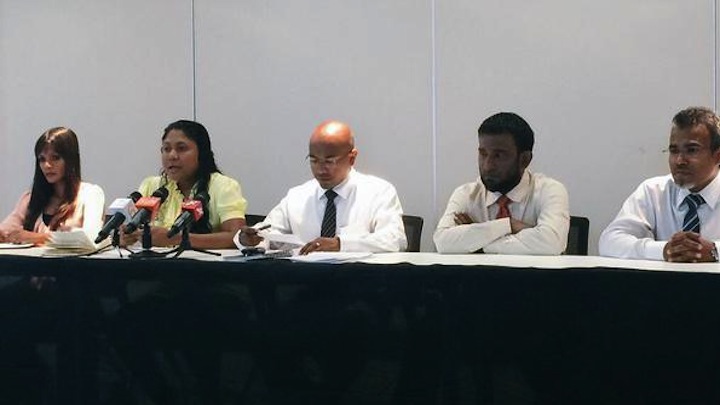The office of former president Mohamed Nasheed has accused foreign minister Dunya Maumoon of “deliberately misleading” the UN Human Rights Council regarding the opposition leader’s terrorism trial.
During the Maldives’ Universal Period Review in Geneva on May 6, Dunya claimed that Nasheed chose not to appeal his 13-year sentence and that due process concerns regarding the trial were procedural and not substantive.
Criticism of Nasheed’s trial had “mainly focused on the process and not the merits,” she said.
But Nasheed’s office contends he was deliberately denied the right to appeal after the criminal court failed to provide necessary documentation within the ten day appeal period specified by the Supreme Court.
“The Maldives’ criminal court refused to release the transcript of the trial — information vital to the launch of an appeal — until 11 days after conviction, thus deliberately preventing Nasheed’s legal team from appealing,” reads a statement released yesterday.
It added that Nasheed’s lawyers informed the court of their intent to appeal four days after the conviction on March 13.
“The lawyers repeatedly asked the criminal court for the trial transcript, but the court refused to release it until the window for appeal had closed. When the transcript was finally released, it had been doctored and was full of irregularities,” the statement continued.
President Abdulla Yameen and other senior government officials have repeatedly advised Nasheed to appeal. Prosecutor general Muhthaz Muhsin told Minivan News last week that the High Court could accept an appeal despite the expiration of the 10-day period.
“I personally think this case has a high possibility of being accepted at the high court since Nasheed is a former president, since it is related to a judge and since it is a terrorism charge,” he said.
But Nasheed’s lawyers say the Supreme Court, in the same ruling that had shortened the 90 day appeal period to ten days, had removed the High Court’s discretionary powers.
The apex court in January had voided Article 42 of the Judicature Act which set out appeal deadlines and gave judges discretionary powers in accepting late appeals. The 90–180 day appeal period obstructed justice, the Supreme Court said. A new 10-day appeal period was set out, but the apex court was silent on procedures for late appeals.
Nasheed’s lawyer, Hisaan Hussain, told the press today there was no “legal basis” for the government’s stance.
She suggested the government was encouraging Nasheed to appeal because it could determine the outcome through its undue influence over the judiciary.
“The government is saying in the same breath that it does not meddle in court cases but that there is still the opportunity to appeal despite the 10-day period elapsing,” she said.
Nasheed wanted to appeal, but was effectively deprived of the right to appeal due to the criminal court’s “deliberate” refusal to release the transcripts until the 11th day after sentencing, she said.
The legal team reiterated calls for president Yameen to exercise powers under clemency laws to pardon and release Nasheed.
Lawyer Hassan Latheef claimed 10 countries had called for Nasheed’s release during the UPR session, warning that the Maldives could face international sanctions if the government does not comply.
Nasheed was found guilty on terrorism charges relating to the detention of criminal court chief judge Abdulla Mohamed in January 2012.
Amnesty called the conviction a “travesty of justice” while the UN human rights chief said Nasheed was sentenced after a “hasty and apparently unfair trial” and noted “flagrant irregularities.”
The special rapporteur noted “serious due process violations” such as denial of the opportunity to present defence witnesses, which led her to believe “the outcome of the trial may have been pre-determined.”
The European parliament meanwhile adopted a resolution condemning the “serious irregularities” of the trial while US secretary of state John Kerry said during a visit to Sri Lanka that Nasheed was “imprisoned without due process”.
“This is an injustice that needs to be addressed soon,” he said.
 (0)Dislikes
(0)Dislikes (0)
(0)